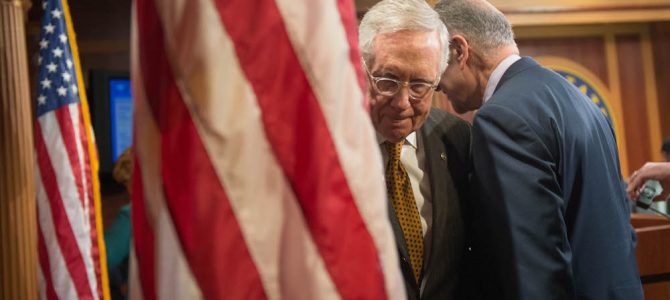
In high school literature class we used to yuk it up when a “natural child” popped up to drive the plot in old English novels. Most of us were from boring two-parent households and wholesomely limited in outlook. We thought of illegitimate children as quite the opposite of natural, and figured the term was just Elizabethan sarcasm.
It was our first encounter with a term of art: a word or phrase that has a specific meaning in a particular field like law, politics, or estate settlements muddied by long-past romance, but which differs from how most people would understand it.
“Double jeopardy” in law doesn’t mean standing up while riding a rickety, itinerant-carnival roller coaster. “Broom clean” in real estate isn’t how your mom made you leave your room before going to a friend’s house. “Background” in journalism had better reveal less, not more, about a source.
But terms of art have a dark version, not surprisingly a popular tool in Washington, in which meaning is intentionally confused to outmaneuver opponents. The Gorsuch confirmation reaching its climax this week is a timely example, in which judicial confirmation and debate cloture votes are being intentionally conflated.
Today’s ‘Nuclear Option’ Is A Confusing Term Of Art
It started with Senate Minority Leader Charles Schumer (D., N.Y.) repeatedly making the claim, mostly unchallenged by the press, that confirmation has always required 60 votes, not 51, as actually required by the Constitution. The idea rolled through the weekend news shows and into Monday morning’s Today program. In the span of perhaps five minutes, Matt Lauer, reporter Peter Alexander, and legal analyst Ari Melber—along with Mr. Schumer on video—all said that Republicans were going to “change Senate rules” (or some close formulation) to confirm Mr. Gorsuch.
By Wednesday, NBC’s Christine Welker was saying that Republicans were “poised to use the nuclear option needed to approve Gorsuch.” Coverage on the other networks fit the pattern.
It nearly always went unexplained that this was a stylized and heavily elided characterization—the “rules” to be changed in this scary “nuclear option” pertaining not to confirmation, but to ending a Democratic filibuster—itself a term of art, since filibusters these days are merely threatened, rarely proceeding to “Mr. Smith Goes to Washington” extremes.
The need for a filibuster this time was defended by Senate Judiciary Committee member Chris Coons (D., Del.), who waved the bloody shirt of Barack Obama’s nominee, Merrick Garland.
“Seven months of refusing to hold any hearings, or any vote, in this committee, on President Obama’s last nominee, is nothing if not a successful, the most successful, partisan filibuster ever,” he told NBC.
Mr. Garland was the victim of timing and circumstance—specifically, being nominated in the full flood of a watershed presidential election. But this is a familiar pattern in politics, where language is massaged as needed to distort meaning and conceal intention, like liar’s poker but with a trillion-dollar bill instead of a one.
Our Liar’s Poker Politics Conceal Meaning From Voters
“Net neutrality,” for example, the phrase used to describe Federal Communication Commission rule-making two years ago, sounded like it might reflect a hands-off approach. It actually increased government involvement in Internet access standards.
Political conversation has for decades been littered with such Orwellian substitutions: lately, “identity” is routinely used to describe a person’s aspirational gender instead of their biological one. “Hunger” explored often finds not swollen-belly starvation, but poor food choices. A “child” can be a shaving teenager, when shot by police. The “judicial mainstream” is defined by fealty to precedents like Roe, not Heller, and certainly not Citizens United.
Even more cagily, some insist that millions of people don’t have “health care” when what they really lack is “health insurance.” Then they volte-face and insist the government should offer “health insurance,” when what they mean is “health care,” as in single payer provider of. The tactic is to exaggerate the problem and then soft pedal the interventionist prescription.
America’s Political Wars Are Full Of Fake Words
It’s hard not to pity the left. They were unfairly born into a country so stubbornly benighted that they’ve had to weaponize language to command submission to their greater wisdom. Their counterfactual reality has become so complex by now that it takes near full-time effort to maintain it, and the strain is starting to show. For instance there’s the conflict between women’s rights and the “right” of some cultures to oppress them, cultural appropriation and the ability to “identify” as whatever form of life one prefers.
We hear much about the polarization of politics, but not the abasement of language that both reflects and encourages it. Alternative facts, fake news, profound distrust of the media and the political parties all spin out from the problem of words being drained of consistent meaning.
In this context, the verbal clumsiness of the Republican Party’s natural child, President Donald Trump, becomes an asset. It appeals strongly to voters sick of the greasiness that makes setting public policy like a pig catching contest at the county fair. Mr. Trump at least tries to say what he means. What a plot twist it would be if his near inability to do so outflanks his opponents and solidifies his claim to the ancestral moors and manse, beginning with the confirmation of Mr. Gorsuch.









